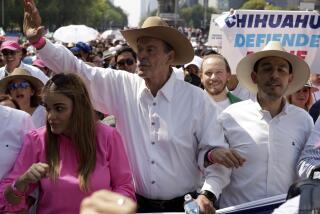In Cairo, trudging to the work of revolution
Emad Mohammed’s morning commute these days is a five-mile trudge through the streets at dawn.
The soft-spoken 35-year-old accountant dodges roving bands of armed government supporters, who would beat him or worse if they knew where he was headed.
Then he walks across the Qasr El Nil Bridge, a main artery into central Cairo, as pale morning mist rises from the broad, green river. He steps past a line of weary young army conscripts squinting in the morning sun. And stops in front of rolls of barbed wire to dig out his identity card so he can pass into Tahrir Square.
Easy, he says. I’ll do it every day forever, if I have to.
Of course, he and tens of thousands of other protesters are hoping that forever is at hand. They have dubbed this “gomat el raheel,” the “Friday of Departure.” On this day, they want President Hosni Mubarak gone.
That didn’t happen, though pressure intensified on the Egyptian leader to step down.
In the meantime, the daily trek to the square — its name, Tahrir, means “liberation” — has taken on an almost matter-of-fact, workaday feel.
Momentous events unfolding? Yes, of course, people say as they stride hurriedly across the bridge. But right now, I’m just getting myself to where I need to be.
Salma Ayman, with a mop of curly graying hair tied back from her face, has a very particular job in mind on this morning. She has gathered up dozens of juice boxes from her kitchen and is headed to the square to deliver them to the protesters. It’s going to be a hot day. People will be thirsty.
“Everyone has to do what they can,” she said.
On cool winter evenings, the Qasr El Nil, a majestic 1930s-era span with sweeping views up and down the Nile, is popular with Cairenes out for a stroll, a favored venue for an inexpensive date. In normal times, tourists sometimes pose by the giant lion statues that flank the bridge. Now the stone just beneath them is daubed with graffiti: “Mubarak — game over.”
The crowd of bridge crossers thickens, and Ahmed Samir, a dapper engineer, keeps an eye on his family: his daughter, his mother and a cousin, all on their way to the square. “We have a comfortable life, you know,” he says. “But comfort is not what matters.”
As for Kameer Ihsan, he has a new workplace wardrobe: a white plastic hard hat he will wear in the square.
“Rocks, they will bounce off,” he says, tapping it. “Bullets, maybe not. God will have to protect me.”
---
As protesters continued streaming into Tahrir Square throughout the morning, men laid down measuring tape and drew chalk lines to prepare the rows for Friday prayers. About 1 p.m. they conducted both the afternoon and late-afternoon prayers together, something permissible in the time of war, many protesters reasoned.
On the ground along one wall, someone had laid out each section of the day’s newspaper, the corners weighed down with rocks. Men and women who had been in the square overnight crowded around to read the news they helped make.
Much of the protesting lacked a loud, clear voice that everyone could follow.
As crowds of men and women moved around the square, pockets of different chants rose up, the people seemingly unable to agree on one message.
A woman in a black abaya suddenly yelled out in a high-pitched voice from behind a black veil, “Say no! Say no! The president needs a shove!”
But her attempt to get a unified chant started fell flat, thanks in part to her husband shushing her.
“They need to all chant in one voice,” said Fatma Anwar, a high school Arabic teacher from Oubour, a city three hours’ drive from the square.
But if not in their chanting, she hoped the Egyptian people were at least united in message.
“Despite the factions that we have, they are united on one word: the fall of a dictator,” the mother of two said. “They all hate him and call for his fall.”
Her 21-year-old son had been sleeping in the square since Jan. 27. She had wanted to stay too, but had to go home for her husband and other son.
On Friday, though, she vowed to stay in Tahrir until Mubarak resigned.
---
As more Egyptians poured into the square in the afternoon, welcoming crowds formed along both sides of the road that leads from the Nile.
“Freedom, freedom!” they chanted in a scene that resembled a cross between a parade and “Soul Train.” “Them, them, them — the Egyptians are them!”
An impromptu checkpoint sprang up as men and a few women formed a line frisking newcomers and checking IDs and bags.
Egyptians pointed to the informal security as a sign of how, when left to their own, Egyptians can get organized quickly.
But when speaking about the slights against them, the protesters often yelled over one another to try to make their point, as if years of grievances were trying to get out in a matter of minutes.
More to Read
Start your day right
Sign up for Essential California for news, features and recommendations from the L.A. Times and beyond in your inbox six days a week.
You may occasionally receive promotional content from the Los Angeles Times.







